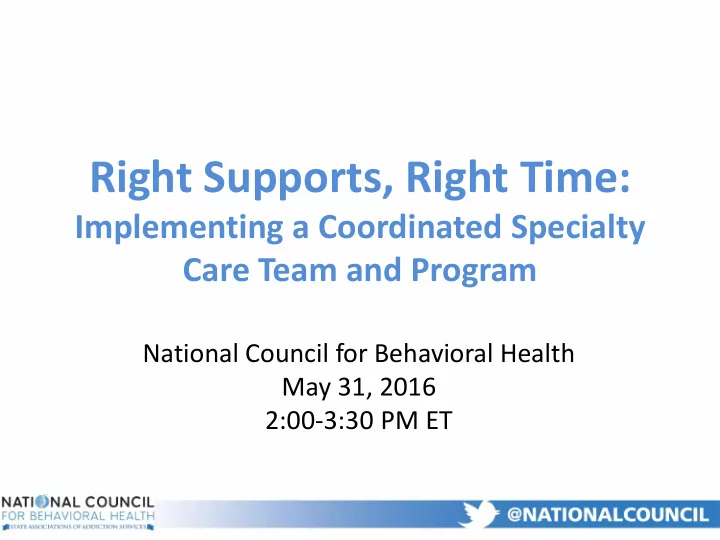

Right Supports, Right Time: Implementing a Coordinated Specialty Care Team and Program National Council for Behavioral Health May 31, 2016 2:00-3:30 PM ET
Introductions Lisa Dixon, M.D., M.P.H. • Department of Psychiatry, Columbia University • Director, Center for Practice Innovations • Division of Mental Health Services and Policy Research • New York State Psychiatric Institute Rhonda Thissen, M.S.W. • Virginia Department of Behavioral Health & Developmental Services, Office of Mental Health Services Kemi Sells, LCSW • Clinical Team Leader • Harris County FEP team Tonya Brown, LCSW • Carey Counseling Center, Inc.
PART 1 This section will discuss the tasks and activities needed to set the stage and prepare the community for the Coordinated Specialty Care program including community outreach and engagement, networking building, and community selection.
Rhonda – Virginia CSC Initiative Background 2013: Expansion of services to transition-age young adults was a recommendation of the Governor’s School and Campus Safety Task Force 2014: Virginia General Assembly allocated State General Funds to support expansion of services 2014: SAMHSA announced MHBG FEP Set-Aside 2015: Virginia CSC Initiative funded with a combination of State General Funds (~82%) and federal MHBG FEP Set-Aside (~18%)
Rhonda – Virginia CSC Initiative Background Eight providers were selected through a competitive RFA process and are now implementing CSC across the state Providers include a mix of urban, suburban and rural sites SFY 2016 funding = $4.57 million With additional 5% MHBG set-aside, SY 2017 budget is $5.293 million
Tonya • Picking a model • Determine eligibility requirements • Go live • Supervision (administrative, individual, team) • Clinical Consultation
Kemi The Texas Department of State Health Services (DSHS) selected The Harris Center as one of two sites in Texas to implement the pilot project funded by the 5% set aside of the Mental Health Block Grant Eligibility requirements, model and training determined by Texas Department of State Health Services (DSHS) Training included the Harris Center (ongoing training) and OnTrackNY, The Center for Practice Innovations Implementation Hiring of Team Providing patient care Ongoing supervision Partnership with OnTrack/DSHS and research team
PART 2 This section will discuss specific challenges and considerations requiring extra attention in your implementation and lessons learned in meeting those challenges which may be helpful for other states/providers developing FEP programs.
Rhonda – Lessons Learned • Collaboration between state and providers is essential and has been successful to date • We lacked a clear understanding of the possible models (e.g., OnTrack, Navigate, EASA, STEP, etc.) • Virginia system is undergoing expansion of peer support services and is committed to including CSC in that expansion - DBHDS Office of Recovery Services developing TA for providers around peer support
Tonya Rural setting Flexibility Reducing barriers to tx Client/Family engagement Outreach Building relationships with other professionals Referrals
Kemi • Requirement to provide a certain amount of patient care hours in order to be reimbursed • Clients with Medicaid/Insurance • Continuity of Care • Team approach • Hiring Staff • Lessons learned Decrease in engagement when employed and in school The need for a transitional period once patient obtains Medicaid/insurance Preference of 180 day authorization vs. 90 day authorization of services
PART 3 This section will describe training needs and activities as well as programmatic oversight.
Rhonda State-level oversight by Virginia DBHDS 7 of 8 sites chose to implement OnTrack, 1 chose NAIGATE DBHDS contracted with Center for Practice Innovations for OnTrackUSA training and technical assistance TA contract includes team training, monthly team role- based calls across sites, access to LMS, and training webinars TBA Two team trainings in mid-2015, based on site readiness for phase-in
Tonya • Making of a team (components) • Training staff (team and specialty training) • Harmonious implementation with the agency and state
Kemi Training The Harris Center (integrated treatment, patient-centered recovery plans, engagement of patients and stages of change) OnTrack NY- Lisa Dixon (Two Day Webinar, online modules and manuals, monthly care consultations and conference calls based on training needs) Programmatic Oversight Weekly team meeting/staffing with psychiatrist Monthly supervision with each staff Training as needed Ongoing contact with Reese Carroll, Texas Department of State Health Services (DSHS)
PART 4 This section will describe outcomes and plans for data collection.
Rhonda – Individuals Served to Date Gender: N = 140 27% Male Female 73%
Rhonda – Individuals Served to Date Race: N = 140 6% 1.5% Black/African American White/Caucasian Asian/Pacific Islander 58% 34% Bi- or Multi-racial
Rhonda – Individuals Served to Date Distribution of Diagnoses 4% Other Psychotic Disorders 31% Schizophrenia 28% Schizoaffective Mood Disorder with 15% Psychosis 22% Schizophreniform
Rhonda Virginia created a CSC Data Workgroup to develop data reporting mechanisms to measure:
Rhonda • Data to be reported through electronic file transfer of extract from providers’ electronic medical records – Virginia Community Services Boards report a variety of client-level data bimonthly to DBHDS and CSC data will be reported using the same secure file transfer method • Formal reporting to begin on March 1, 2016 • Next step: Develop procedures for fidelity monitoring in late Spring 2016
Tonya Data Collection Caseload Antipsychotic medication Staffing management Supervision Recruitment efforts SEES activities Client information Outreach and Crisis recruitment activities Hospitalizations
Kemi 1. Caseload has remained at 60+ (currently at 60 patients) Number of unduplicated clients (112) Number closed due to not engaging (16) Number closed due to patient request (16) Number closed due to obtaining Medicaid/insurance (20) 2. Retained all staff, added new staff (three therapists, four primary clinicians, one employment specialist, one peer educator, a clinical team leader and psychiatrist) 3. Employment Specialist Number of patients working (23) Number of patents in school/college (7)
Audience Q&A
Educate your Members of Congress about your local needs – and why they should invest in your services. REGISTER TODAY FOR THE NATIONAL COUNCIL’S HILL DAY | June 6-7 in Washington, DC
Recommend
More recommend